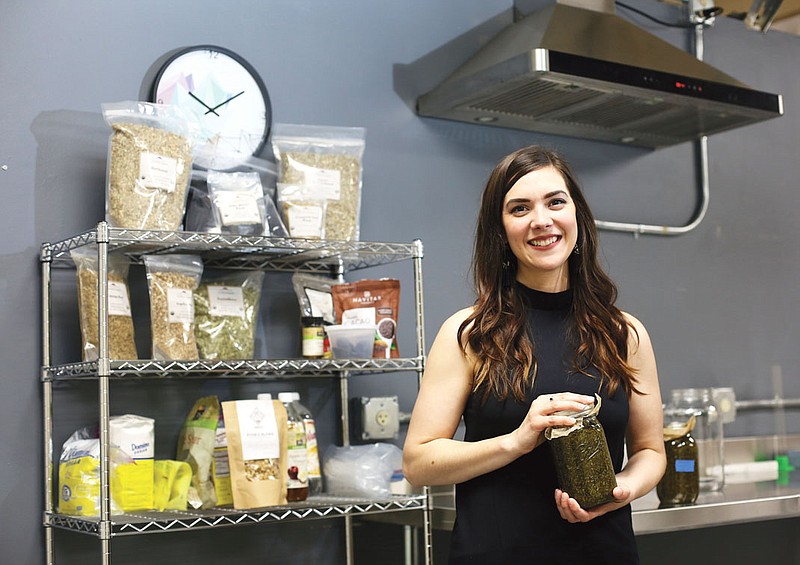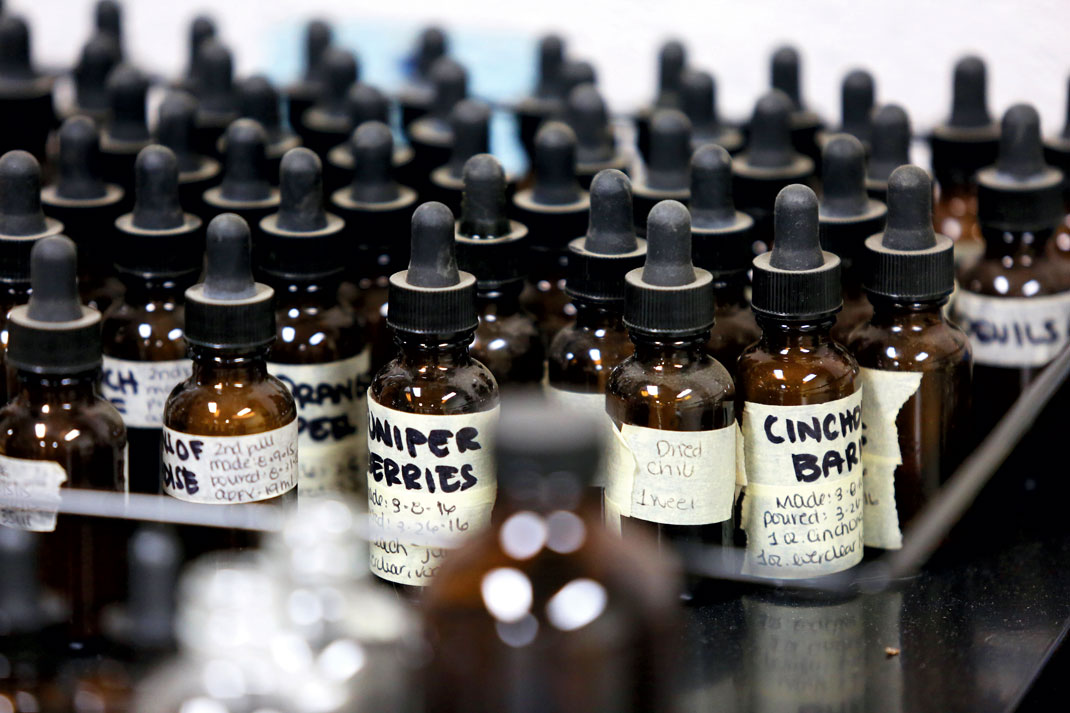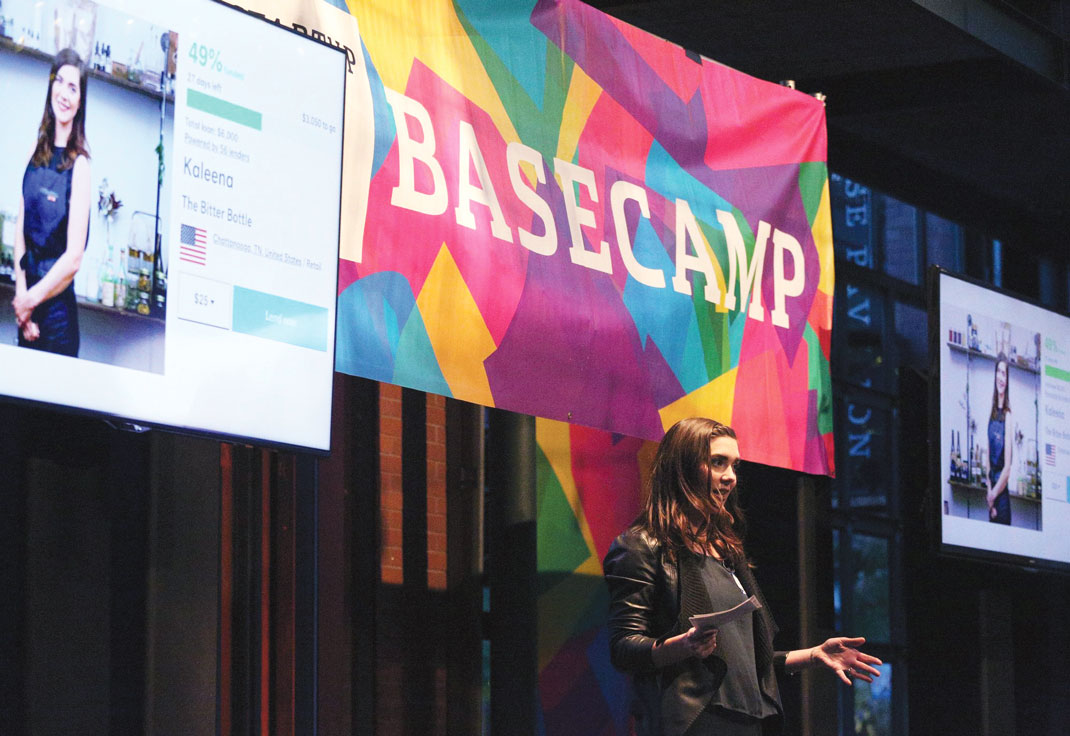When Kaleena Goldsworthy set out to start her own business, The Bitter Bottle, three years ago, she had two significant obstacles in front of her.
First, she would have to become the first alcohol-based, legal bitters company in Tennessee - a state that had Prohibition-era laws in place in the not-too-distant past, and she would have to explain what exactly her product is to regulatory officials who are supposed to be a resource to her and not the other way around.
"Bitters" is a foreign term to a lot of people, said Goldsworthy, a former bartender and manager at the Flying Squirrel in the Southside.
"I like to think of herbal bitters and cocktail bitters as basically like the vanilla extract of the beverage industry," the 33-year-old explains. "So, you are working with alcohol and you are making a super concentrated extract that you only add by the drop or the dash to whatever it is that you are making. It's kind of hard for some people to understand that."
Based on Mark Bitterman's definition in his book, "Bitterman's Field Guide to Bitters and Amari," bitters are not intended for consumption on their own but can be added to food and drink conservatively to create more depth of flavor.
Herbal tinctures, which are just alcohol and botanicals and similar to bitters but without any additives, help promote health and wellness, Goldsworthy said. As an herbalist and bartender, Goldsworthy wanted to combine her knowledge and respect for traditional techniques to the craft cocktail industry, thus creating herbal bitters and tinctures.
Standing in her office at the Hamilton County Business INCubator in the North Shore, Goldsworthy said her hope now is to sell it online and locally as well as nationally, but because bitters require alcohol, she has faced some roadblocks, like antiquated laws and confused regulators.
Chattanooga Whiskey Company co-founders Tim Piersant and Joe Ledbetter faced a similar issue in 2012 when they wanted to make whiskey in the county but they first had to change a law that did not allow liquor manufacturing here.
Goldsworthy herself worked with state lawmakers in 2017 when there was a motion to revise legislation regarding infusion laws. In Senate Bill 798/House Bill 95, Goldsworthy helped add a clause that stated any bitters with an Alcohol and Tobacco Tax and Trade Bureau, or TTB, non-beverage product designation would be exempt from the alcoholic beverage licensing and distribution system.
"When I worked to pass this bill in 2017, they told me that nobody has ever done this before," Goldsworthy says. "When everything is cleared, it will be the first alcohol-based, legal bitters business in Tennessee."
The road to being the first hasn't been easy, though. When all is said and done - hopefully soon, Goldsworthy said - she will have worked with roughly 10 different agencies at the federal, state and local levels, including TTB, the U.S. Food and Drug Administration, Department of Agriculture and potentially the Tennessee Alcoholic Beverage Commission.
"My goal is to create small-batch bitters and herbal tinctures using ingredients grown and created within our city limits, to really showcase our community, our agriculture and our city," she says. "While it's harder to make this happen, I'm determined to find a way to do it."
Food and beverage 101
Chattanooga restaurateur and serial entrepreneur Mike Robinson has been one of the biggest resources and mentors to Goldsworthy as she navigates local, state and federal regulatory systems, Goldsworthy said.
"(Goldsworthy) is just a sponge that wants to learn," says Robinson, the co-founder of Brewhaus on the North Shore and former chief operating officer at Chattanooga Whiskey.
"She has spent the past five years becoming one of the most foremost experts in cocktail and spirits in the city, if not the region," he adds. "She has the base knowledge, talent and drive to really be successful."
Robinson runs The Company Lab's Consumer Goods Accelerator, which launched last summer. The 10-week program is for early-stage companies in the consumer goods sector and provides mentorship from industry partners in the region, tackling business 101 topics such as finance and operations, logistics and manufacturing, growth and distribution and sales and marketing.
Goldsworthy is currently in the program along with 10 other companies but someone with her knowledge of the industry is more of the exception than the rule, Robinson said.
"Nine times out of 10 with food and beverage, it's a sexy industry and everybody associates it with fun and good times at a bar, but that's not what ownership looks like," he says.
When it comes to applying for business licenses and working with regulatory agencies, Robinson says it can be a daunting investment that can feel never-ending.
"You are about to embark on a daunting process, so be patient and diligent," he advises. "If you are not an organized or detailed person, it can be even harder. The amount of paperwork can make you insane."
A distiller license in Tennessee - which takes a minimum of 120 days to obtain, he said - could cost a minimum of $3,000-$4,000, and that doesn't count all the other licenses and inspections that need to be done. Permits from the Department of Agriculture or even the Hamilton County Health Department can cost $300 a piece.
What can make it even more difficult for those dealing in alcohol, like Goldsworthy, is that local governments and state agencies might not understand what permits or inspections are necessary.
A business owner might be looking for resources, but sometimes the resource is the one asking questions, Robinson says.
"(Regulators and officials) just don't understand it because they have never dealt with it," he explains. "It is such a rapidly growing industry that it has outpaced a lot of the laws and structure so a lot of people just don't know."
Farm-to-bar
What does Chattanooga taste like?
Coffee, granola and honey are just a few of the answers that Goldsworthy received when she asked different restaurants and bar owners around the city. The tastes could possibly be a part of Goldsworthy's flagship bitters she hopes to release later this year if all of her permits and inspections are approved.
I like to think of herbal bitters and cocktail bitters as basically like the vanilla extract of the beverage industry. So, you are working with alcohol and you are making a super concentrated extract that you only add by the drop or the dash to whatever it is that you are making. It's kind of hard for some people to understand that.
Goldsworthy, who is currently the event and beverage coordinator at the Hunter Museum, said her goal is to create more of a connection between the agricultural and hospitality industries. For her, they are two industries that will never disappear because of people's emotional need to belong and socialize with others and physical need to always need food and drink.
"I see a lot of restaurants that focus really heavily on the farm-to-table aspect, but I feel like it's even a little bit harder for the bar to get that sort of attention unless you are leading the industry," she says.
For example, a field of violets at a local farm could be sold to local bars and bartenders for cocktail garnishes.
Goldsworthy said she will first launch her product in restaurants and bars but hopes to eventually sell online and market to herbal and tea shops, too. She will sell her bitters in one, four and eight-ounce bottles.
Goldsworthy says she is still figuring out how to bring her products to market in compliance with all of the regulatory agencies. She's exploring new options that include the potential of applying for and acquiring a distiller license in the state.
"I really just want to start selling stuff," she says. "It has been taking me three years to do it the right way, but at least when I get going then I'll know that I did it right."


